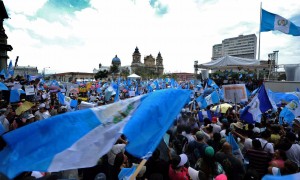 Writing on an Oct. 20 gives me a personal satisfaction, because I consider myself an heir to the liberal tradition that defeated the dictatorship of Jorge Ubico in Guatemala in 1944.
Writing on an Oct. 20 gives me a personal satisfaction, because I consider myself an heir to the liberal tradition that defeated the dictatorship of Jorge Ubico in Guatemala in 1944.
Ubico was succeeded by two revolutionary governments, those of Juan José Arévalo and Jacobo Árbenz Guzmán. In Guatemalan national history, this period is called “the ten years of spring in the country of eternal dictatorship.”
My father, Waldermar Barrios Klee, worked in the National Department of Agriculture, and was one of the advisers to the frustrated agrarian reform that would have led the country down a different path of modernization.
My mother, the first woman enrolled in the School of the Humanities founded as a consequence of the Revolution, was the director of the Belén Institute for Girls. In this period, we had high quality public education and health services. The government established a labor code and a social security system, which had not existed before in the country. And it conceded suffrage to literate women in 1945, after a heated public debate that can be read about in the National Hemerotec.
Unfortunately, it was the time of the Cold War, and the idea of a bipolar world split between Communists and Anti-Communists prevailed. Indeed, it is an idea that still prevails in Guatemala among conservatives who have not been able to evolve.
Putting the memories of October aside, we are on the eve of the second round of elections between two candidates, neither of which public opinion finds convincing. On Oct. 23, we will go to the polls. Afterward, we will maintain vigilance over the winner of the election, and the party system.
Sandra Torres, candidate for the National Union of Hope, a social democrat-oriented party that has already been in government, faces Jimmy Morales, a candidate for a party funded by the military. Morales is a comedian, popular for his television program Moralejas, which characterizes people based on stereotypes, but also tries to communicate moral lessons. His political agenda is basically focused on honor and combatting corruption.
Torres has focused her campaign on the conditional cash transfers that took place during the last government of UNE (2007-2011), which were very popular, as well as the Open Schools Program that was an incentive for marginal and at-risk youth to get an education.
These programs are targeted to the most vulnerable sectors of the population, and although the UNE government carried out voter registration drives and sought to educate women about their civic rights and encourage them to vote (at the time, these measures sparked accusations of political clientelism) it is not certain that these sectors will participate in the electoral process.
On the other hand, even if the fans of Moralejas find themselves in a social situation similar to the majority of Torres’ supporters, Morales has more support in the urban and rural lower middle class, which tends to participate more in elections.
Which social sector will tip the balance? This is the big unknown that will be revealed on Oct. 25. Even though some people are predicting that there will be abstention.
A series of unforeseen circumstances led us to this election: first, the fall of the president and vice president after the revelation of a corruption network that they had created to steal state resources and tax revenues, and second, the demonstrations that consolidated opposition to several politicians, including Manuel Baldizón, who had faced Otto Pérez Molina in the second-round of elections in 2011 and had been considered the favorite by opinion polls.
Everyone is waiting to see how the citizenry will respond to this opportunity. In the first round, there was a 70% turnout, which is considered a success especially because analysts had predicted high abstention and null votes. Now, analysts express are cautious about predicting.
We are only a few days away from the moment when reality will again be reflected and the citizens will mark the future of the country. Whoever wins the elections, the Guatemalan citizenry has become more aware of the importance of participation. Even if participation does not necessarily translate into voting, I am confident they will continue to participate as a public watchdog on the new leaders.
The youth that participated in the weekly Saturday demonstrations say that they will turn into auditors and evaluators of the new government. Let’s hope so.
October has been a beloved month to Guatemala. It is considered the month of the Revolution of 1944 that defeated the dictatorship of Jorge Ubico, and set the country on a path towards modernization—a path, unfortunately, truncated by U.S. intervention during the Cold War.
Oct. 20 is commemorated with a massive march that celebrates past victories and demands change.
This year, October represents the country’s future destiny and the hope that the citizens will continue to play their role in an effective democracy.
Walda Barrios-Klee is the coordinator of the Gender and Feminist Studies Program at the Latin American School of Social Sciences or FLACSO, Guatemalan academic branch, and a member of the Women’s Association for Feminist Studies or AMEF.
Translated by Simon Schatzberg



